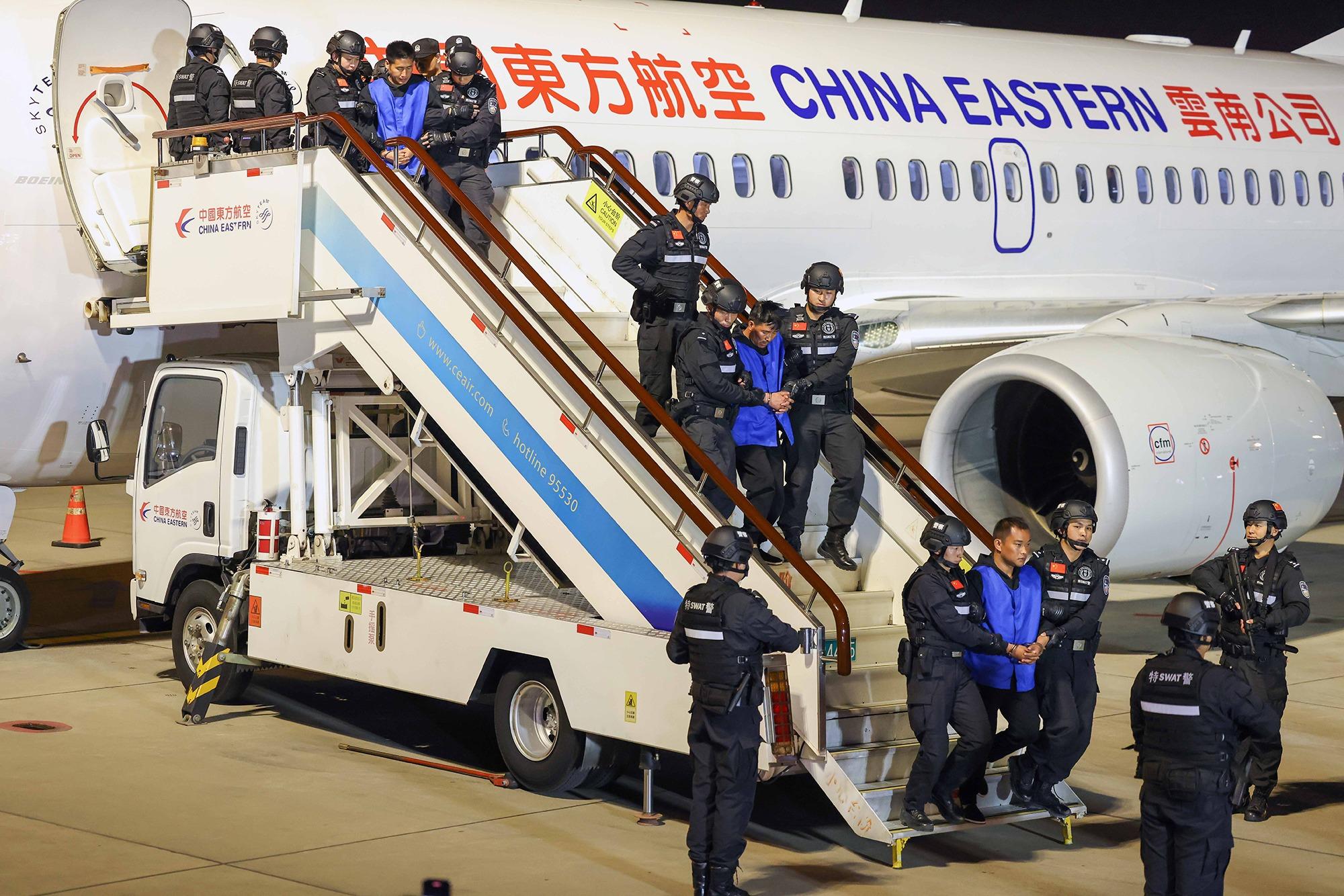 Ten major crime suspects, including six suspected of orchestrating telecom fraud against Chinese people from northern Myanmar, are escorted to Kunming, Yunnan province, on Jan 30, 2024, after being returned to China by Myanmar police. (PHOTO / XINHUA)
Ten major crime suspects, including six suspected of orchestrating telecom fraud against Chinese people from northern Myanmar, are escorted to Kunming, Yunnan province, on Jan 30, 2024, after being returned to China by Myanmar police. (PHOTO / XINHUA)
An integrated approach will be adopted combining measures to combat, prevent and control telecommunications fraud and related crimes and promote comprehensive governance of the telecom network, as the situation regarding such crimes remains complex, said China's procurator-general.
"Telecom fraud has seriously infringed on the vital interests of the people and eroded the foundation of social integrity, and such crimes are deeply abhorred by the public," said Ying Yong, procurator-general of the Supreme People's Procuratorate, in an exclusive interview with China Daily during the ongoing annual sessions of the nation's top legislative and political advisory bodies in Beijing.
Procuratorial authorities will thoroughly implement the instructions of the central authorities on cracking down on telecom fraud, strengthen cooperation with other departments, take an integrated approach and fully utilize the power of the rule of law to maintain stability, he said.
READ MORE: SPP commits to fighting rise in telecom fraud
According to the top procuratorate, since 2023, procuratorial authorities nationwide have collaborated with public security organs and other departments to implement various measures to resolutely curb the frequent and severe trends of telecom fraud at the source in a systematic manner.
In 2023, a total of 51,000 individuals were prosecuted for telecom fraud, a year-on-year increase of 66.9 percent. The Supreme People's Procuratorate and the Ministry of Public Security also jointly dealt with five major transnational telecom fraud cases.
Crimes associated with telecom fraud were also severely punished, with the prosecution of 147,000 individuals involved in aiding information network criminal activities, marking a 13 percent year-on-year increase. About 75,000 people were prosecuted for concealing and disguising criminal proceeds and illegal gains via telecom networks, an increase of 106.9 percent year-on-year.
Ying emphasized the need to strengthen the governance of sectors closely related to telecom fraud, such as personal information protection. Telecom fraud often involves the infringement of citizens' personal information, seriously undermining the interests of the people.
Efforts have intensified to combat crimes involving the infringement of citizens' personal information, resulting in about 8,500 prosecutions last year.
Procuratorates also fulfilled their duties in public interest litigation, focusing on key areas such as personal information protection in key industries, SIM card and bank card management, and corporate anti-fraud obligations, and urged relevant departments and companies to strengthen supervision and protection.
According to the SPP, telecom fraud and related crimes are usually well-organized, and various forms of scams have proliferated in recent years, including click farming, fake shopping services, impersonation of e-commerce customer service and false credit reporting.
Criminals are also utilizing artificial intelligence and other emerging technologies to use "deepfakes" to perpetrate fraud, making their fraudulent activities even more covert.
In response to the new challenges in the battle against telecom fraud, Ying urged the procuratorial authorities to fully carry out their duties such as in approving arrests, prosecutions and supervising litigation, and further intensifying efforts to crack down on transnational telecom fraud.
It is necessary to strengthen the building of specialized teams, continuously improve the research and application of big data legal supervision models related to fraud, and persistently enhance the capability and level of legal supervision, he said.
Procuratorial authorities were also asked to strengthen their publicity work, using concrete examples to explain laws and providing preventive warnings, in order to enhance the public's anti-fraud awareness.
Ying said that procuratorates should integrate the work of asset recovery and mitigation of damages throughout the judicial process, fully leverage the system of leniency for pleading guilty and accepting punishments, and urge criminals to return stolen assets in order to minimize the economic losses suffered by victims.
ALSO READ: China solved nearly 400,000 telecom, online fraud cases in '23
According to the SPP's analysis, there are so-called "technology parks", "industrial parks" and "development zones" in some overseas locations that specifically provide venues for criminal activities such as telecom fraud. Criminal groups recruit individuals to participate in telecom fraud, tightly control these recruits and allow fraudsters to benefit from the proceeds of fraud through profit-sharing after successful scams.
Jointly fighting transnational telecom fraud has become an important consensus of the international community. As an important force in combating such crimes, Chinese procuratorates have carried out a series of measures, making China a global example in this field, Ying said.
He also called for greater global unity on combating telecom fraud and related crimes.
The SPP has strengthened pragmatic cooperation with the prosecution authorities of ASEAN countries in assisting in cross-border investigation and evidence collection, extraditing criminal suspects, exchanging intelligence and sharing information.


